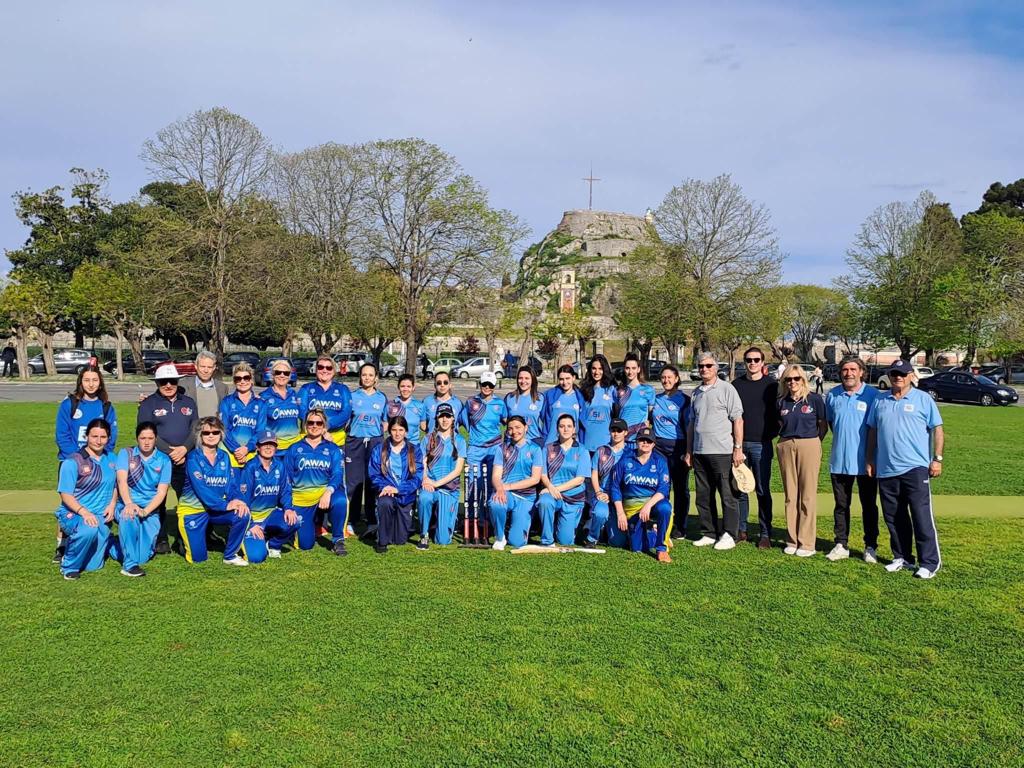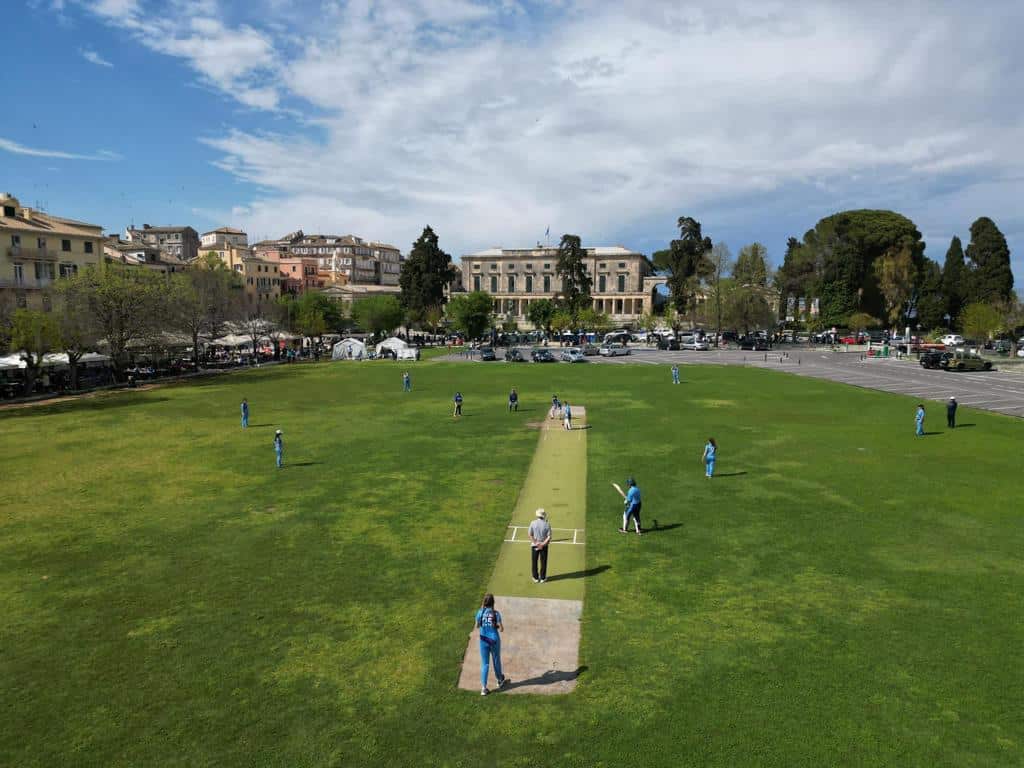By every measure available, football is Europe’s favourite sporting pastime. This isn’t just due to the historical roots, with the sport taking hold in most regions in the 19th century. It was propelled by national rivalries, professional leagues, and passionate fans who bring a vibrant atmosphere to matches, as well as its accessibility in terms of facilities.
Cricket can be played almost anywhere
It’s true that it can be played almost anywhere, from small local pitches to large stadiums. It also has the advantage of being fundamentally simple.
Cricket, on the other hand, has all the quirks and complexities that reflect its English provenance. Its rules are seen as complex. Yet while it is true that the sport requires specific, often expensive equipment and a marked area for formal competitive play, recreational versions can be played almost anywhere with a bat, ball, and a few players.

Earlier this April, this vision of community-based cricket came to life in Corfu, Greece, on the historic green in the centre of the city, to mark the 200th anniversary of Greek cricket on the island.
The Greek Cricket Federation (GCF), hosted the UK Parliament, the British Army Development XI, The Gurkha Regiment, The Lord’s Taverners, The Royal Household CC and the Greek National Women’s teams in Corfu, Greece, for the good of the sport and in aid of mental health.
Cricket is not a traditional sport in most of Europe but is growing due to a combination of dedicated organizers such as the GCF and immigrants from the Indian subcontinent, where the sport is the most popular.
34 countries in Europe play cricket
Germany, for instance, now has more than 10,000 cricket players, making cricket the fastest-growing sport. Indeed, 34 countries around the continent now have fully recognised ICC (International Cricket Council) status. Europe is no longer the outlier, now that the world’s second most popular sport – cricket – is taking hold here in earnest. This is very good news for Europe.

Playing cricket regularly can help improve agility, coordination, cardiovascular health, stamina, balance, fine and gross motor skills, weight loss, and muscle strength. Cricket requires quick reactions, alertness, and sharp hand-eye coordination, which can help in other areas of life.
Additionally, the sport can help build physical and mental stamina, as well as promoting weight loss and muscle strength. Cricket is also conventionally played in summer sun, which is itself strongly associated with calm and focus via the release of the neurotransmitter serotonin.
Besides physical health, cricket offers opportunities to learn more about the sport, develop tactical knowledge and build concentration skills. Building tactical knowledge can help individuals to think more deeply and develop an understanding of patterns of play. Cricket players must also concentrate for long periods, and a lack of concentration can result in costly mistakes during a game.
Playing cricket can also help individuals to work as a team, developing social skills and encouraging collaboration. These benefits can lead to improved mental health, reduced stress, and a better overall sense of well-being.
More sport, less stress
By directly addressing issues of loneliness, and self-esteem, and by promoting socialisation and cooperation, sport has been shown to be strongly associated with sound mental and physical health both in childhood and adulthood and with lower rates of stress. When people play, that is often taken as the first sign of recovery from trauma.
It is these advantages that motivate the Lord’s Taverners, a sports accessibility charity which uses cricket to positively impact young and disadvantaged lives across the EU and beyond. The charity, led by David Gower, a former England cricket captain and an iconic figure in cricket, has a mission to provide “a sporting chance” to disadvantaged young people through their ‘Wicketz’ programme. The programme offers coaching and sports opportunities to young people from communities with limited opportunities, both economically and in sports. The programme teaches young people about teamwork, camaraderie, and purpose.
Cricket, a new opportunity for life and health
Many young people, including Mohammed Malik from Luton, joined the programme for the promise of free coaching and sport. Malik joined at the age of 12 and found himself enjoying the sport, the community, and the competition. Now, at the age of 19, he is a qualified cricket coach, has played county cricket for Bedfordshire, and is giving back to the programme that introduced him to the sport.
Community sport provides a positive outlet for young people to improve their mental/emotional well-being and focus on hope, purpose, and community, as stated by Gower.

Having emerged from the COVID-19 pandemic, Europeans are now enduring mental health difficulties to an unparalleled extent. The way in which various governments handled the pandemic and its aftermath has also brought home that we cannot rely only on governments to remedy mental problems.
Furthermore, it is widely recognised that state-provided care in the mental health space is in many ways inadequate (when not dangerous). Local and charitable initiatives are however uniquely situated to improve the life quality of citizens. For example, by providing spaces for people to play sports such as cricket.
Indeed, outdoor sports activities have for a long time been a part of life in Britain, and the hope is that this vision can spread to Europe. Communities gathering together during the weekend or bank holiday to take part in or observe a game of tennis, football, or cricket; sipping Pimm’s and Lemonade, consuming nibbles and sandwiches, and catching up with friends and family.
Cricket is also a formidable spectator sport. Those watching from the boundaries can also do other things alongside the game, such as have a barbeque. Others can watch alone, with some chewing gum, an activity which has been shown time and again by mental health experts to aid relaxation and enhance the effectiveness of relaxation techniques.
Bringing this English tradition to Europe is likely to have a noticeable impact not only on physical, but also on mental health. In an era where tackling loneliness in our increasingly atomised society is ever higher on the agenda, providing facilities for people to spontaneously meet up and engage in healthy activities will prove to be a key feature of a broader project to improve mental health, especially for young children.
Nigel Adams MP, present with the UK Lords and Common’s team, reiterated this point, saying that “more time for activity in the school day is so essential and this fact has been borne out by lockdown”. In particular, there is emerging evidence that socialisation helps to deal effectively with what is known as depression in modern life. One expert notes that one of the leading causes of depression is isolation, loneliness and lack of social support.
She writes that if people can get some degree of social and emotional support, they will get through difficult times more easily and smoothly. This in turn will improve one’s social confidence, which often takes a blow during depressive episodes, leading to a virtuous cycle whereby social interaction generates more social interaction and potentially a route out of emotional difficulties.
If one adds the social element of sport to the opportunity to exercise, with the attendant release of endorphins, offering facilities to engage in these activities presents a venue to tackle the depression and anxiety epidemic, without having to “medicate” and hide every emotional difficulty or problem in life.









